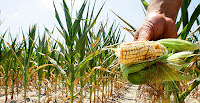For a while, it seemed as though the big questions about what weather forecasters call the "Great Plains Drought" in the summer of 2012 had been answered.
It was the most peculiar and damaging drought in U.S. history. As it parched the earth over U.S. breadbasket states from May through August, it caused $30 billion worth of damage. It cut normal precipitation by 47 percent; slashed the nation's expected corn crop by 26 percent; and broke all drought records extending back through the severely dry Dust Bowl years of the 1930s to 1866, when the first records appeared.
Two years ago, after going through drought records and reviewing 120 forecasts and 12 climate models, Martin Hoerling, a meteorologist and leader of a climate research team at the National Oceanic and Atmospheric Administration, which runs the National Weather Service, wrote a paper with six other scientists concluding that, unlike most droughts — which give advance warnings — the 2012 drought was a "climate surprise."
But last November there came another surprise. Two scientists from the National Center for Atmospheric Research determined that if the weather forecasters had looked at the disappearing soil moisture and dwindling winter snows falling in the region — data collected in an NCAR model between 1980 to 2012 — they might have predicted the drought as early as four months before it happened.
To a number of atmospheric scientists, the need for more advanced prediction of extreme weather events falls under the heading of "news you can use." Anjuli Bamzai, a program director for the National Science Foundation, which supports NCAR's efforts, noted in a press release: "Advance knowledge of a drought even a month or two ahead of time can greatly minimize the effects on society."
The conflict between the two studies sheds more light on an ongoing discussion among scientists, state and local government officials, insurance companies, businesspeople, farm groups, and others about what more might be done to reduce the damage from a mounting number of extreme weather events.
Part of it focuses on weather forecasts and how they might be improved to give earlier warning. And part of it concerns potential flaws in computer-driven climate models and the voids and errors they contain that may ignore warnings of ominous weather events.
Read more at Why the Worst Drought in U.S. History Was a 'Climate Surprise'

No comments:
Post a Comment